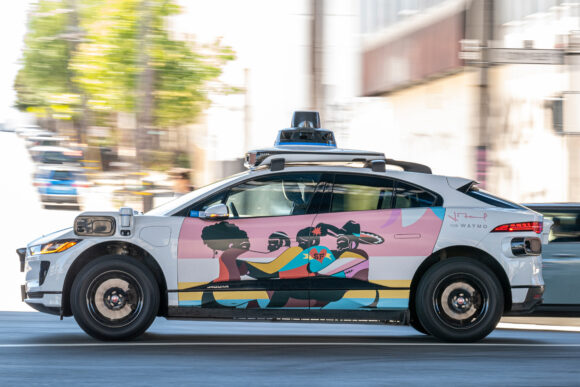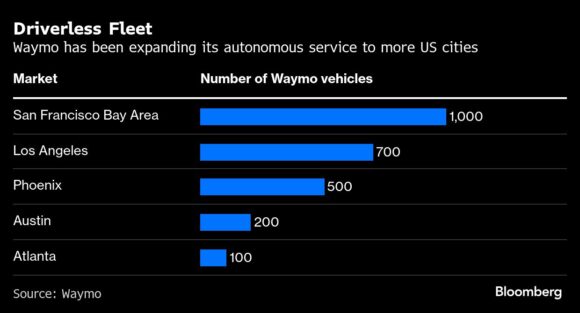Waymo will become the first robotaxi provider in the U.S. to offer driverless rides on highways, a milestone that positions it to better compete with ride-hailing companies and traditional taxi services.
Beginning Wednesday, the Alphabet Inc. unit will begin offering some riders routes that include freeways in San Francisco, Phoenix and Los Angeles, it said in a statement. Freeway service will be available 24 hours a day. Users who have opted in to Waymo’s new services and features will be the first to be able to try this kind of trip.
Related: Boston Weighs Clampdown on Driverless Taxis in Threat to Waymo
Waymo will gradually make the new service available to more users over time, the company said. It declined to share a timeline for expanding highway routes to other markets where it operates.
Waymo’s expansion beyond testing into commercial freeway service marks a turning point for the company and cements its position as a leading U.S. robotaxi provider. The launch of freeway services has the potential to make Waymo more competitive with rideshares and traditional taxis, which aren’t restricted from operating on freeways. And customers can potentially enjoy shorter trips now that Waymo vehicles don’t have to plan a route that avoids freeways.
Waymo’s US rivals are also testing highway driving and in some cases charging customers, but until now the presence of a human in the car was a given. Tesla Inc. recently launched its self-driving cab services in Austin, where it offers some highway rides, with a safety monitor in the driver seat for those kinds of routes. (It also has human monitors present for non-highway rides, but they sit in the passenger seat in those cases.) Separately, the Elon Musk-led company is testing a purpose-built self-driving “Cybercab,” which Musk said will go into production in April.
Outside the US, Chinese robotaxi company WeRide Inc. already offers some rides on highways in Abu Dhabi, also with safety drivers.
Mountain View, California-based Waymo said it’s relying on the same software stack and sensor suite for freeway driving that it uses for urban roads. But to augment its systems for motorway conditions, it used a combination of closed course and simulation testing. The system has been trained to handle both “rare” and “inevitable” driving conditions, it added.
Related: NHTSA Investigates Waymo Robotaxis Over Safety Around School Buses
The cars are designed to keep up with traffic, traveling up to the speed limit on highways, according to the company. If there is a need to pull over, the cars aim to exit the freeway and find a safe spot on a nearby road, it said.
Waymo is also expanding its coverage zone in the Bay Area to San Jose. That region will include new access to San Jose International Airport, where Waymo cars will charge the same airport access fee as other taxis.
Waymo said it is also actively working with San Francisco International Airport, where it’s currently permitted for testing.
Related: Uber Taking on Waymo in San Francisco With Lucid, Nuro Robotaxis
The company said it does not expect the freeway service to add meaningfully to local congestion. Its fleet currently includes 1,000 cars in its San Francisco Bay Area service area, 700 in Los Angeles, 500 in Phoenix, 200 in Austin and 100 in Atlanta.
Top photo: A Waymo autonomous taxi in San Francisco, California, on Thursday Aug. 10, 2023.
Topics USA California
Was this article valuable?
Here are more articles you may enjoy.




 AIG’s Zaffino: Outcomes From AI Use Went From ‘Aspirational’ to ‘Beyond Expectations’
AIG’s Zaffino: Outcomes From AI Use Went From ‘Aspirational’ to ‘Beyond Expectations’  The $10 Trillion Fight: Modeling a US-China War Over Taiwan
The $10 Trillion Fight: Modeling a US-China War Over Taiwan  Trump’s EPA Rollbacks Will Reverberate for ‘Decades’
Trump’s EPA Rollbacks Will Reverberate for ‘Decades’  Fingerprints, Background Checks for Florida Insurance Execs, Directors, Stockholders?
Fingerprints, Background Checks for Florida Insurance Execs, Directors, Stockholders? 

